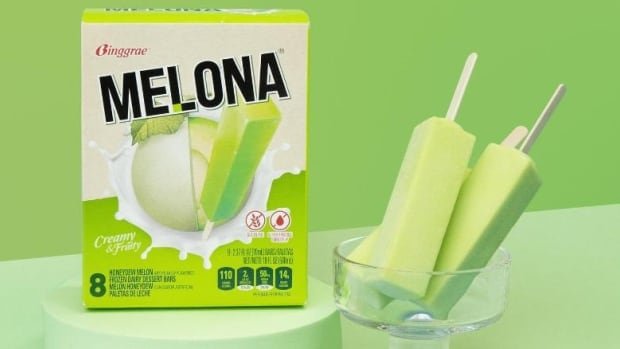Bronwyn Chhay runs an ice cream cart every summer at a Calgary park. Yet she noticed in July that one of her most popular treats — Melona, a creamy Korean brand of frozen dessert bar — was proving increasingly difficult to track down.
“We hadn’t been able to find them in weeks,” Chhay, the owner of ice cream sandwich brand D’Served, told CBC News. “The flavours started slowly disappearing and then there were no flavours, so we were running around everywhere looking for them.”
Once a delicacy found only in Asian specialty stores, Melona bars — available in a variety of flavours like honeydew, mango, pistachio, ube, coconut and strawberry — eventually became a Canadian grocery store staple and a dessert menu item at some restaurants.
Chhay realized she wasn’t the only one who’d noticed the sudden disappearance of Melona bars in Canada when she made a July 17 TikTok post about them. It now has almost 225,000 views, more than 17,000 likes and hundreds of comments from users lamenting the fact they could no longer find the brand.
Where had the popular ice pops gone? On its official Instagram account, Melona Canada told a user who’d inquired about the treats that the disappearance was temporary because they were “currently experiencing shipment delays.”
In a Facebook post, the brand’s distributor said Melona fans could soon expect a non-dairy version of the bars on Canadian shelves.
But why Melona bars disappeared in the first place was still a mystery. Could it all really be chalked up to shipment delays? CBC News reached out to several government agencies and the Canadian importer to find out what happened to the treats.
Rumours of a dairy dispute
On social media, rumours swirled about taxes and mislabelled dairy products and disputes between Melona’s parent company, Korean food giant Binggrae, and Canada’s dairy commission — the first ingredient in a classic Melona bar is listed as milk.
A Reddit thread about the disappearance of Melona bars in Canada indicated that the treats were still available at some stores, but not others where they’d been stocked in the past.
The Canadian Dairy Commission, which deals with public policy related to dairy products in Canada, referred CBC News to other agencies.
The Canadian Food Inspection Agency, which manages food product labelling and safety, said it had no record of complaints or food safety investigations related to dairy labelling of Melona products.
A spokesperson for the Canada Border Services Agency (CBSA), which administers customs tariffs, noted that while it couldn’t share company names or details, importers are responsible for correctly classifying the goods that they bring into Canada, and for paying any duties and complying with regulations set by the agency.
Global Affairs Canada, which controls import and export permits, told CBC News that Binggrae supplies its products to “allocation holders” under what’s known as a tariff rate quota (TRQ).
When companies are allocated a TRQ, they can bring specific amounts of an imported supply-managed product into Canada for a reduced duty rate. There’s no limit on the amount that can be imported at a higher duty.

‘Disagreement’ between importer, customs
Binggrae told CBC News that due to a “disagreement” between the Canadian importer and customs authorities, the export of seven varieties of Melona bars had been halted.
“The import and distribution of Melona in Canada are managed by the importer,” the spokesperson wrote, identifying Melona’s Canadian importer as Seasia Foods, a Vancouver-based company that specializes in South East Asian products, according to its website.
According to this list, Seasia Foods is one of only 41 companies that hold a TRQ allocation for ice cream in Canada.
Seasia Foods owner Stanley Uy told CBC News that the dispute with the CBSA relates to whether Melona bars should be classified as ice cream or whether they should be classified as ice bars that contain milk.
“I’d love to import the original version,” Uy said.
But for now, his distributor says a non-dairy version of the bars will be rolling out to stores across Canada in early August in melon, mango and coconut flavours. There’s no TRQ required to import the non-dairy bars.
A non-dairy option
Chhay said the news that Melona would be supplying a non-dairy option “is awesome, because we’re able to get our hands on it pretty soon.”
Chhay recalls that when she was a child, the treats were sold strictly at Asian supermarkets before becoming available at mainstream Canadian grocery stores, “so they were a little bit more rare.” She says she always preferred the melon and banana flavours.
While Melona bars will return to Canadian stores in August, they will remain dairy-free for the time being.
Chhay suggests that as long as the bars taste the same, it won’t matter to Canadians.
“They just want their Melona back.”

Leave a Reply